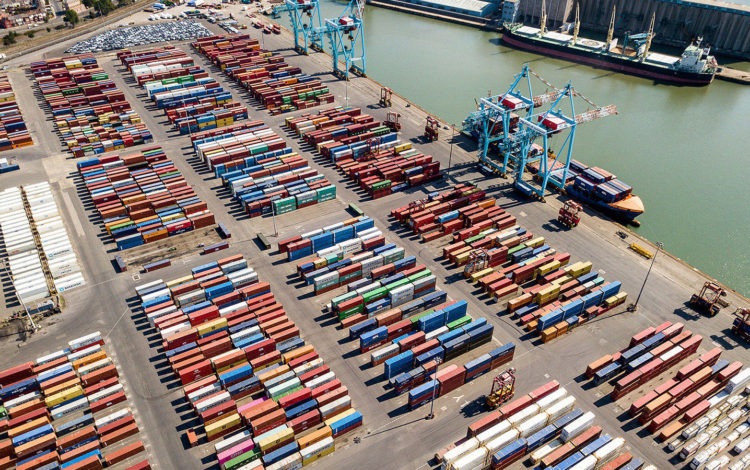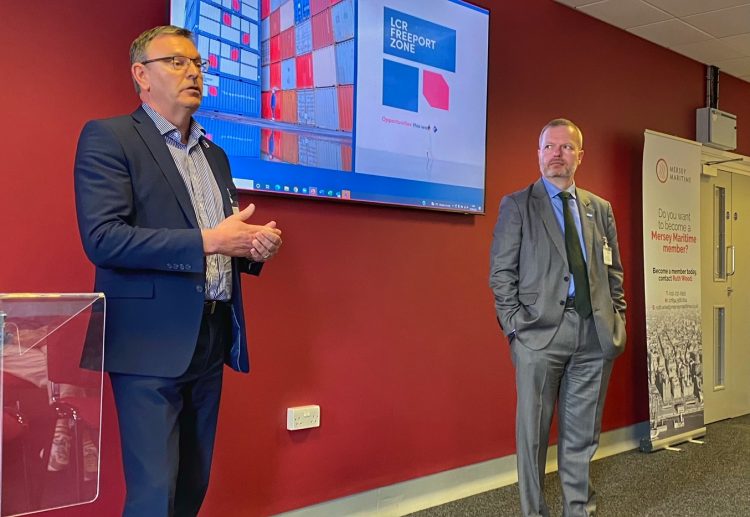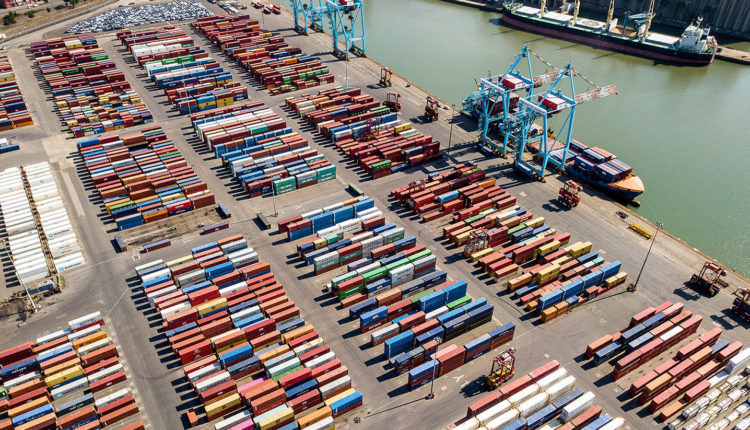Due to go live this year, the Liverpool City Region Freeport could condense 20 years of growth into 10 years, creating more than 10,600 jobs in that timeframe. Tony McDonough reports

Liverpool City Region Freeport has the potential to condense 20 years of growth into 10 years with the creation of 10,600 new jobs.
It could also add £1.3bn in annual Liverpool city region GVA (economic output) in the same timeframe, according to LCR Freeport director John Lucy. He said: “This will accelerate growth and job creation across the city region.”
John was addressing a packed audience of maritime industry leaders and professionals at a special event held at Mersey Maritime in Birkenhead. Also speaking was Tim Morris, chief executive of UK Major Ports Group, a trade body representing nine UK port operators covering 40 UK ports.
Liverpool city region will be home to one of just eight Freeports in England due to go live this summer. They are expected to be hubs of business and enterprise which have the potential to create thousands of jobs, help regenerate coastal communities and establish Britain’s post-Brexit place in the world.
In March 2021, Chancellor Rishi Sunak announced that Liverpool city region would be one of eight new English Freeport zones. The others are Thames, Solent, East Midlands, Freeport East (Felixstowe and Harwich), Plymouth and South Devon and Humber and Teeside.
A flagship policy in the Conservative’s 2019 election manifesto, Freeports are designated zones where normal tax and customs rules do not apply. These can be airports or other hubs as well as maritime ports. At a Freeport, imports can enter with simplified customs documentation and without paying tariffs.
However, according to both John and Tim, the new Freeport will go much further than previous incarnations, which were mainly based within sea ports and were chiefly focused on the customs benefits.
READ MORE: Freeport set for take-off at Liverpool Airport
READ MORE: Freeport drives up city region industrial demand
Britain had seven Freeports, including one at the Port of Liverpool, a designation which came to an end in 2012. The UK’s entry into the EU single market and customs union in 1992 lessened the freeport benefits. But, John insists, contrary to popular belief, Liverpool’s Freeport was a success.
He explained: “It created millions of sq ft of warehouse space around the Port of Liverpool and when we joined the single market in 1992, the EU implemented many of the things we were doing. The new Freeports we are creating today are much more ambitious.”
And so they are. Rather than being focused on a single location, the LCR Freeport will include multiple locations and will stretch out as far as Port Salford at the far end of the Manchester Ship Canal.
They include the Port of Liverpool, which will be the primary customs site, three tax and customs sites – Wirral Waters, the £100m Parkside logistics scheme, and the 3MG multi-modal terminal at Widnes.
Other customs sites could include Liverpool John Lennon Airport, Borchard Lines container terminal, Port Garston, Port Weston, Port Salford, Stobart rail terminal . Knowsley rail terminal, Garston rail terminal, Stanley and Atlantic Park industrial estates and pharmaceutical companies AstraZeneca and Tava.
The tax zones at Wirral Waters, Parkside and 3MG will focus on investment in manufacturing and logistics, advanced manufacturing, innovation and research and development activities. 3MG will also play a critical role in HyNet, a multi-billion pound project to transport low-carbon hydrogen to transport and industry across the North West.


Customs Zones will benefit from investment into advanced and biomanufacturing, to logistics and ports. These sites will undergo an approval process with Government/HMRC as part of the development of the outline business case.
John talked of his own experiences of working in freight forwarding within the ‘fast fashion’ industry in Morocco. He said: “They created a Freeport at Tangiers and, 20 years on, it is now the biggest port in Africa, number one on the Mediterranean and is home to the world’s biggest automotive cluster.
“I have seen with my own eyes how well it has worked… what we are doing is about bringing quality jobs into the Liverpool city region. Our Freeports are being sold by the Government’s Department for International Trade all over the world.”
This global promotion by the UK Government, he said, had already generated huge interest in the Liverpool city region. He added: “We are seeing international interest from investors in Asia, the Middle East and the US.
“There has been so much interest that it is almost becoming too big too fast. There are already thousands of Freeports across the world so this isn’t a mystery to them – they know what the benefits are.”
Liverpool’s position as a westward-facing port is a particular advantage for US based investors. According to John, one area of particular interest is the growth in electric vehicle innovation and production.
In the last few years there has been a move towards ‘onshoring’, the process of companies moving business processes from overseas into their own countries. This is particularly true of the automotive sector. This shift, says John, offers great potential for the LCR Freeport.
He says the sectors of most interest are aerospace, automotive, green energy, bio-manufacturing and chemicals, food and drink and innovation. Decarbonisation will play a major role in the Freeport. There are plans for a fleet of trial hydrogen lorries to transport goods across the city region.
Within Wirral Waters, the £25m Maritime Knowledge Hub will become a centre of excellence for both decarbonisation and digital innovation. There are plans to create Freeport skills academy to ensure as many people as possible benefit from the new employment opportunities and there will also be Freeport Masters degrees created in partnership with both universities .
Turbo-charging the regeneration of disadvantaged coastal communities is at the heart of the Freeports strategy, said Tim Morris. He was keen to address criticisms of Freeports. They would not be, he insisted, be “warehouses full of stolen artworks surrounded by razor wire”.
Four themes have emerged, he explained, to ensure the policy offers “diversity of outcome”. They were: Ambition – to create both green energy and multi-modal trading hubs; Sustainability – both in terms of zero carbon and offering as wide a social value as possible; International trade – growing the UK’s post-Brexit trade.
The fourth, he said, was standards of integrity. Putting robust procedures in place to ensure Freeports did not become the illicit tax havens imagined by their critics. Tim added: “Four years ago, one port industry leader told me that while Freeports were a great idea he was convinced they would never happen. Look how far we have come.”
Freeports, he added, were an opportunity to build on the advantages already offered by the ports sector which directly employs more than 100,000 people, is 55% more productive than the UK average and offers 20% high wages.
“It is a sad reality that many of the UK’s poorest communities are located in our coastal regions – and that is not a north/south divide” said Tim. “We have something we think will work for areas with profound pockets of need.”
Freeports, he added, could “transform ports and transport hubs into engines and anchors for growth and opportunities for areas that really need it. When we started out on this journey it was tempting too to see sustainability as a box to tick.
“But now they have really come through as essential parts of all the bids… there is a lot of industry interest in Freeports and this process has really turbo-charged a lot of the conversation between port operators and people across their local communities.
“The success of Freeports will be judged not just on how much money or how many jobs were generated but on its integrity as well. Not just on what is produced, but also on how it is produced.”

